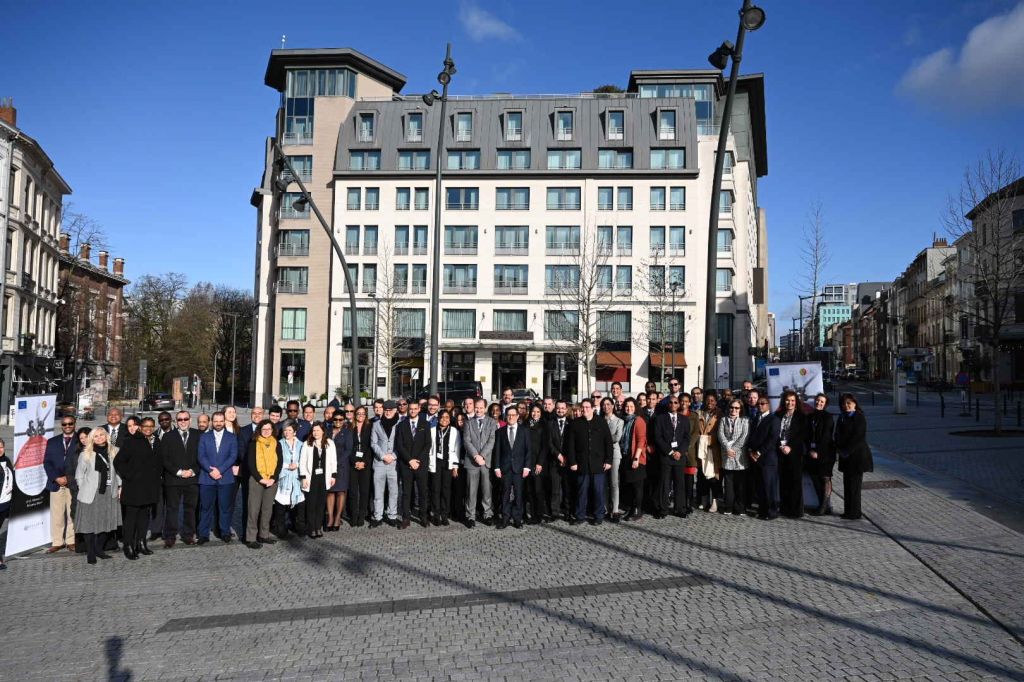Meeting Contribution of COPOLAD to the tasks of the EU-CELAC Mechanism

- Start date
- 19/02/20
- End Date
- 21/02/20
- Place
- Brussels, Belgium
Operative Dimension
- Code
- 0.8-9.30
- Year
- 2020
- Component
- C0 - Crosscutting issues
- Execution Level
- Finished
- Activity Types
- Associated operational objectives
-
0.1 - Establish the necessary operational bases to ensure the quality and coherence of the work to be performed and the necessary coordination and participation of all partners.
0.2 - Have adequate baseline information to: provide specificity to the contents and the actions planned in each component; meet initial expectations of each partner in relation to its participation in COPOLAD; and facilitate the programme evaluation.
Theoretical Dimension
Participant Institutions
This is a restricted section for participants who attended this activity. Ask for your username and password sending an email to info@copolad.eu
If you already have an username and password, you must log in at My COPOLAD and return to this activity to see the restricted sections.
Participation
Participation for regions
Participation of countries for region
Participants
This is a restricted section for participants who attended this activity. Ask for your username and password sending an email to info@copolad.eu
If you already have an username and password, you must log in at My COPOLAD and return to this activity to see the restricted sections.
Press Release
High-level representatives on drugs policies from 30 Latin American and Caribbean countries meet in Brussels to assess COPOLAD's contribution to the work of the EU-CELAC Coordination and Cooperation Mechanism on Drugs

Brussels, 19 February 2020. The International and Ibero-American Foundation for Administration and Public Policies (FIIAPP), through the Cooperation Programme between Latin America, the Caribbean and the European Union on Drugs Policies (COPOLAD II), a programme financed by the European Commission, is organising the meeting entitled "Contribution of COPOLAD to the work of the EU-CELAC Coordination and Cooperation Mechanism on Drugs".
The opening words are given by the Director of Public Administration and Social Affairs (APAS) of FIIAPP, Peggy Martinello, Ramón Espinosa from the European Commission's Directorate-General DEVCO, the Mexican Ambassador to the EU, Mauricio Escanero, in his capacity as CELAC's Chair to the EU-CELAC Coordination and Cooperation Mechanism on Drugs and the Responsible of Institutional Relations and Strategy of COPOLAD, Claudia Liebers.
COPOLAD receives in Brussels around 70 representatives of the National Drug Agencies of CELAC and diplomatic representatives who participate in the Technical Committees and High-Level Meetings of the EU-CELAC Coordination and Cooperation Mechanism on Drugs. A total of 30 countries are present during these three days in Brussels, one of the last meetings held in the framework of the second phase of COPOLAD, which will end in June 2020. Antigua and Barbuda, Argentina, The Bahamas, Barbados, Bolivia, Chile, Colombia, Costa Rica, Cuba, Dominica, Dominican Republic, Ecuador, El Salvador, Grenada, Guatemala, Guyana, Haiti, Honduras, Jamaica, Mexico, Nicaragua, Panama, Paraguay, Peru, Saint Lucia, Saint Vincent and the Grenadines, Suriname, Trinidad and Tobago, Uruguay and Venezuela are the countries participating in this important meeting.
The importance of the EU-CELAC Coordination and Cooperation Mechanism on Drugs and the role of COPOLAD in strengthening it.
The EU-CELAC Coordination and Cooperation Mechanism on Drugs is a privileged space for dialogue between the regions of Latin America, the Caribbean and the European Union, which results in the identification of common priorities in many areas of these policies, and which has in coordination and cooperation its best tools to face the great challenges linked to the world drug problem. It is, therefore, an exceptional framework for the exchange of experiences between these two regions, which has led to the development of an excellent relationship in terms of addressing related policies, which has resulted in notable progress and advances in recent years in this area.
The COPOLAD programme has a direct link to the Mechanism, helping to promote the work carried out, and providing technical content to the different areas of drug policy, both in the field of Drug Demand and Supply Reduction. COPOLAD also continues to place special emphasis on the importance of evidence-based drug policy and to emphasize the key role of establishing and strengthening National Drug Observatories in the region of the Americas.
During the working session on the first day, where these advances are shared as a result of the synergies between COPOLAD and the Mechanism, the important role of the CELAC Diplomatic Missions to the EU in Brussels and the importance of coordination between the Drug Agencies and these Missions is highlighted. During these days, the representatives of these 30 countries will take advantage of the meeting to participate in the Meeting of the Technical Committee of the EU-CELAC Coordination and Cooperation Mechanism on Drugs, which is being held this week in Brussels. In addition, within the framework of the planned activities, COPOLAD has organized visits to the headquarters of the Council of the European Union, the European Parliament, the European Commission and the European External Action Service (EEAS)
Gallery
Downloads
Restricted documents
This is a restricted section for participants who attended this activity. Ask for your username and password sending an email to info@copolad.eu
If you already have an username and password, you must log in at My COPOLAD and return to this activity to see the restricted sections.
Related activities
-
0.8-9 - Institutional Coordination meetings and contacts.
Activity Information
- Description
- Operative Dimension
- Theoretical Dimension
- Participant Institutions
- Participation
- Participants
Activity Content
- Press Release
- Restricted documents
- Photo gallery
- Related activities






















































